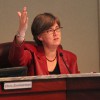 Arlington lost its long-held vote on the Washington Metropolitan Area Transit Authority (WMATA) Board this month, as an appointed representative of the state government was granted voting power on the Board in place of Arlington’s representative.
Arlington lost its long-held vote on the Washington Metropolitan Area Transit Authority (WMATA) Board this month, as an appointed representative of the state government was granted voting power on the Board in place of Arlington’s representative.
Now the Arlington representative, County Board Chair Mary Hynes, is limited to “alternate” status on the Metro Board. In response, Hynes released a statement expressing disappointment but also noting that the county “does still have a voice at Metro.”
For the first time since Metro was formed in the 1960s, Arlington does not have a principal voting seat on the Board of Directors for the Washington Metropolitan Transit Authority (WMATA). The seat that was previously Arlington’s is now filled by a Commonwealth of Virginia representative.
Of course we’re disappointed.
Arlington does still have a voice at Metro. As an alternate WMATA Board member, I continue to serve as a voting member of all Metro committees, where, under WMATA Board rules, all of the Board’s important work is performed. While the exact composition of the committees — Governance, Finance & Administration, Customer Service and Operations, Safety and Security , Planning, and Audits — has yet to be determined, the WMATA Board has agreed that all Board members will continue to be welcome at all Committee meetings. I pledge to you that I will continue to vigorously represent Arlington’s interests and ensure that our viewpoints are heard.
It’s also fair to say that we’re concerned about the role the Commonwealth will play in continuing strong support for WMATA‘s – and our region’s – future.
The eight principal voting members of the Board of Directors hold our region’s future in their hands. It is a funding and governance responsibility Arlington has taken very seriously for more than 35 years. No one in the region disputes that Arlington has nurtured a spirit of regionalism in its approach to critical challenges, even as we’ve been a leader in fully utilizing the tremendous opportunities that regional transit investment provides to local communities. It’s also fair to say that, to date, the Commonwealth of Virginia has had a far less keen interest in supporting vital transit services than have the founding Virginia WMATA jurisdictions – Alexandria, Arlington and Fairfax.
This month, the Northern Virginia Transportation Commission – the body which appoints WMATA Board members — unanimously passed a resolution PDF file I co-authored that calls on WMATA Board members to actively work together for the good of the agency, our local jurisdictions and our region. I am heartened by this agreement. The resolution also called on the Commonwealth to “provide sustainable and dedicated revenues to support WMATA, in order to ensure the safety and reliability of the Metro system and the economic sustainability of our region.”
Clearly, Metro is an invaluable asset in the region. And Arlington will continue to invest in Metro. Our Metro system is the largest urban transit system in the United States without dedicated funding. We will continue to advocate for long-term, dedicated funding for the system, which is essential to ensure the long-term sustainability of WMATA. It is our hope that, as the Commonwealth assumes 50% of Virginia’s voting power on WMATA, the Governor and General Assembly will rise to meet the enormous, unavoidable challenge of vigorously supporting transit so that Northern Virginia can remain one of the Commonwealth’s strong economic engines – a role it has played for many decades.
While Arlington is losing some influence on the Metro Board, it is gaining some influence on another regional transportation body. County Board member Jay Fisette was just elected chairman of the Northern Virginia Transportation Commission.
“NVTC plays a vital role in coordinating and managing transit in Northern Virginia,” Fisette said in a statement. “I look forward to working with my colleagues from throughout the region to protect and improve the existing transit systems, and to ensure that we are meeting the growing demands of this region.”

